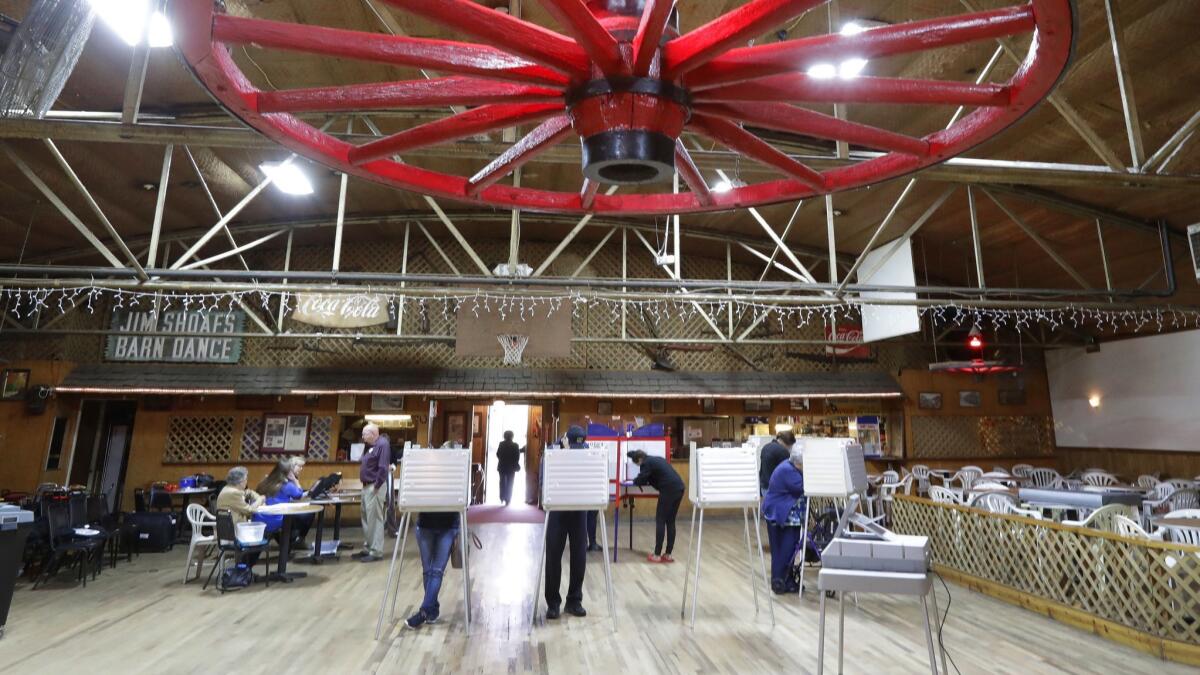Op-Ed: Constitution demands a do-over in North Carolina’s 9th Congressional District

The final undecided seat in the U.S. House of Representatives is now in the hands of the North Carolina Board of Elections and Ethics Enforcement. After refusing to certify the result in the state’s 9th Congressional District — where Republican Mark Harris leads by just 905 votes — the board is now investigating allegations of illegal ballot harvesting, tampering with absentee ballots and a leak of early voting results.
The question for North Carolina election officials — and potentially for the new Democratic House majority — is what to do now. Between possibly fraudulent absentee ballots and ballots not cast, there’s simply no way to know who actually won. Constitutionally, there is only one credible solution: The general election, and probably the primary, must be re-run in the 9th District.
The House of Representatives, part of the “people’s branch,” was designed by the framers to be the most democratically accountable part of the federal government. A person must win an election to serve in the House. By way of contrast, the electoral college selects the president and, under the original Constitution, state legislatures selected senators. The 17th Amendment changed Senate elections to a popular vote in 1913, but midterm vacancies can in most states still be filled by an appointee of a state’s governor.
Making early or absentee voting even more difficult — in North Carolina or elsewhere — would be a misguided response.
No such provision exists for appointments to the House of Representatives. When a member of the House resigns or dies while in office, a special election must be held to fill the seat -- even if this means that the people of a particular district must go without representation for weeks or even months as a result.
The imprimatur of direct democracy is so important, in fact, that a person duly elected to serve must be seated. The House has the constitutional authority to discipline or even expel a member, but only after seating him.
In the 1960s, the House refused to seat New York Rep. Adam Clayton Powell Jr., voting to “exclude” him because of alleged personal and financial misconduct. The House declared the seat vacant and a special election took place. The voters of Powell’s district, by an overwhelming margin, again returned him to Congress and that time he was seated.
The exclusion issue, however, went to the Supreme Court. In 1969, the justices held that a person who secured the most votes and otherwise met the minimum constitutional requirements of age, citizenship and residency could not be excluded from the House. Chief Justice Earl Warren explained that “a fundamental principle of our representative democracy is, in Hamilton’s words, ‘that the people should choose whom they please to govern them.’”
In other words, if a district’s voters want to send a scoundrel to represent them, that is their constitutional prerogative — so long as the scoundrel was properly elected.
In North Carolina, the election board can order a new general election if it concludes that the goings-on in the 9th District “taint the result of the entire election and cast doubt on its fairness.”
If they refuse, the House is not without recourse. The House Committee on Administration can investigate, and if it harbors doubts in the election’s validity, it can (and should) simply declare the seat vacant. That would force North Carolina to hold a new election, including new primaries.
Recently, states have been handing down harsh punishments against individual voters who violate election laws. In Texas, for example, a non-citizen received an eight-year sentence for voting illegally. In North Carolina, several African American voters faced criminal charges for merely voting while on probation. These behaviors, although unlawful, did not compromise the outcome of an election. North Carolina should respond proportionally if candidates, consultants or party leaders are implicated in election fraud in the 9th District. Allegations of tampering with absentee ballots demand a serious reaction.
Even so, making early or absentee voting even more difficult — in North Carolina or elsewhere — would be a misguided response. Making voting more difficult, through fewer polling stations that generate long waiting lines on election day, actually enables the type of ballot harvesting fraud alleged in this case. If one has to drive 20 miles and then wait for three hours to vote, of course you’d like that nice young woman to come pick up your absentee ballot at your house.
Enter the Fray: First takes on the news of the minute from L.A. Times Opinion »
When voting is simple, easy and quick, the opportunities for skullduggery shrink. Several western states, including California, Oregon, and Washington, have adopted reliable and easy vote-by-mail programs. In these jurisdictions there were more than a few very close contests, but no credible allegations of widespread election fraud. Moreover, enabling more citizens to vote in House elections would significantly enhance the body’s democratic bona fides and better fulfill the framers’ intentions.
This is an important moment for American democracy. To certify either Republican Mark Harris or his Democratic opponent, Dan McCready, as the winner would be to seat a person whose legitimate election to the House is open to grave doubt.
The people of the 9th District have a constitutional right to select a person of their own choosing to represent them. North Carolina needs to permit them to exercise this right in a free and fair election — even if that requires an expensive and time-consuming do-over.
Ronald J. Krotoszynski Jr. is a law professor at the University of Alabama and author of “Reclaiming the Petition Clause.”
Follow the Opinion section on Twitter @latimesopinionand Facebook
More to Read
A cure for the common opinion
Get thought-provoking perspectives with our weekly newsletter.
You may occasionally receive promotional content from the Los Angeles Times.






